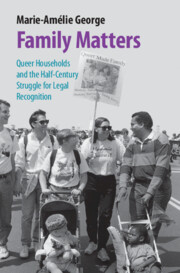Book contents
- Family Matters
- Studies in Legal History
- Family Matters
- Copyright page
- Dedication
- Contents
- Figures
- Acknowledgments
- Abbreviations
- Introduction
- Part I Queer Partners and Parents
- 1 Legalizing Queer Life
- 2 Contesting Custody
- 3 Recognizing Relationships
- 4 Adopting Change
- Part II Straight Parents, Queer Children
- Part III Queer Families
- Epilogue
- Notes
- Bibliography
- Index
- Studies in Legal History (continued from page ii)
4 - Adopting Change
Social Workers, Foster Care, and the Expansion of the Queer Family
from Part I - Queer Partners and Parents
Published online by Cambridge University Press: 27 May 2024
- Family Matters
- Studies in Legal History
- Family Matters
- Copyright page
- Dedication
- Contents
- Figures
- Acknowledgments
- Abbreviations
- Introduction
- Part I Queer Partners and Parents
- 1 Legalizing Queer Life
- 2 Contesting Custody
- 3 Recognizing Relationships
- 4 Adopting Change
- Part II Straight Parents, Queer Children
- Part III Queer Families
- Epilogue
- Notes
- Bibliography
- Index
- Studies in Legal History (continued from page ii)
Summary
At the same time as some gays and lesbians were fighting for domestic partnership recognition, others were demanding the right to create families through foster care and adoption. In the 1980s, social workers who were struggling to find homes for foster children increasingly turned to same-sex couples. Those placements proved controversial, leading several states to institute bans on gay and lesbian foster parenting. But the debates they generated helped to make queer families increasingly visible. Adoption out of foster care was only one way in which same-sex couples had children. In the 1980s, lesbian couples increasingly began forming families through donor insemination. To create a legal relationship between the nonbiological mother and the child, the couples petitioned courts to grant second-parent adoptions, analogizing their situations to stepparent adoptions. Over the course of the 1990s, courts increasingly authorized these types of adoptions, which helped entrench queer families in American life.
Keywords
- Type
- Chapter
- Information
- Family MattersQueer Households and the Half-Century Struggle for Legal Recognition, pp. 131 - 160Publisher: Cambridge University PressPrint publication year: 2024



